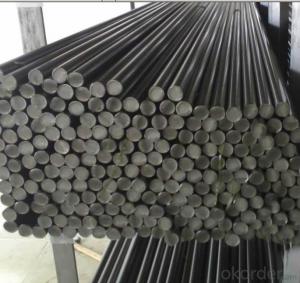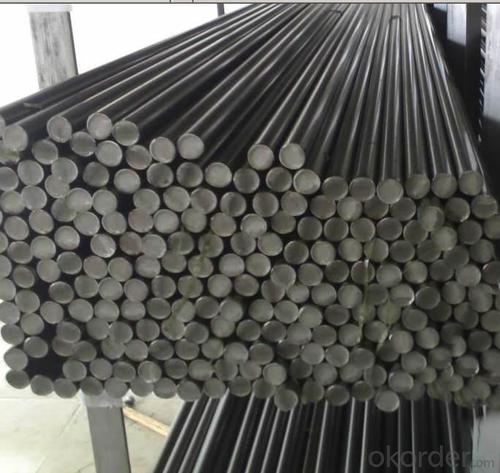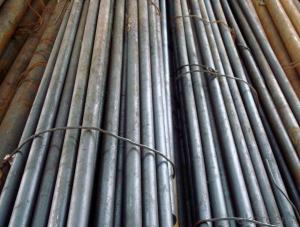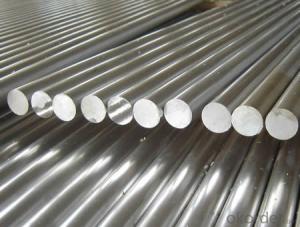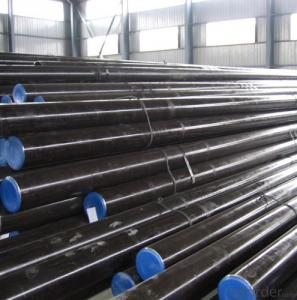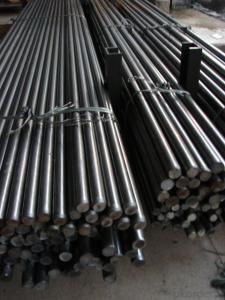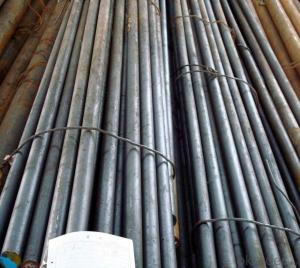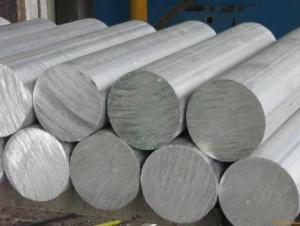High Quality Spring Steel Round Bar 12-16mm
- Loading Port:
- China main port
- Payment Terms:
- TT or LC
- Min Order Qty:
- 100 m.t
- Supply Capability:
- 10000 m.t/month
OKorder Service Pledge
OKorder Financial Service
You Might Also Like
High Quality Spring Steel Round Bar 12-16mm
Product Description:
Spring Steel can be divided into two types. One is carbon spring steel, and other one is alloy spring steel.
Alloy spring steel is based on carbon spring steel, by adding one or more alloying elements to improve the mechanical properties, hardenability and other properties to meet the requirement for manufacture all kinds of spring steel.
Specification of High Quality Spring Steel Round Bar 12-16mm:
-Material: 1065
-Standard: ASTM
-Production: Hot rolled or cold rolled
-Type: Spring Steel
| Diameter(mm) | Mass(kg/m) | Section(mm2) |
| 12 | 0.888 | 113.04 |
| 15 | 1.39 | 176.625 |
| 16 | 1.58 | 200.96 |
Corresponding Steel Grade of High Quality Spring Steel Round Bar 12-16mm for Reference:
USA, ASTM | CHN, GB/T | JPN, JIS | ISO |
1065 | 65 | SWRH67A SWRH67B | Type SC Type DC |
FRA, NF | GBR, BS | ||
C66D | C66D |
Chemical Composition of High Quality Spring Steel Round Bar 12-16mm:
C | Mn | Ni | Si |
0.62~0.70 | 0.50~0.80 | ≤0.30 | 0.17~0.37 |
P | S | Cr | Cu |
≤0.035 | ≤0.035 | ≤0.25 | ≤0.25 |
Mechanical Properties of High Quality Spring Steel Round Bar 12-16mm:
-Tensile Strength σb (MPa): ≥695
-Yield Strength σs (MPa): ≥410
-Elongation δ10(%): ≥10
-Percentage reduction of area: ψ (%): ≥30
-Hardness HBS, no heat treatment: ≤255
Usage/Applications of High Quality Spring Steel Round Bar 12-16mm:
-ASTM1065, is medium-high carbon spring steel. After heat treatment, this type of steel obtains high strength, hardness and elasticity but this material isn’t perfect for welding.
-Its fatigue strength is equal to alloy spring steel when they are in same configuration.
-For manufacturing spring, spring circle, all kinds of grommet, clutch, and axels in the production of normal machine.
Packaging & Delivery of High Quality Spring Steel Round Bar 12-16mm:
-Packing Detail: The products can be packed in bundles by steel wires.
-Marks: There are two types of marks. One is color mark and other one is tag mark. We paint color marks on both ends of bundles to make sure that it’s more convenient for customers to distinguish their products from other products at the destination port. The tag marks will be tied up to each bundle to make sure that customers know the specifications of each bundle like product’s name and size and other information of products.
-Delivery Detail:
1, Delivery time: 30~60 working days after receive buyer’s T.T. or L/C.
2, Delivery status should be written in the contract. (Heat treatment or no)
FAQ:
Q1: Why buy Materials & Equipment from OKorder.com?
A1: All products offered byOKorder.com are carefully selected from China's most reliable manufacturing enterprises. Through its ISO certifications, OKorder.com adheres to the highest standards and a commitment to supply chain safety and customer satisfaction.
Q2: How do we guarantee the quality of our products?
A2: We have established an advanced quality management system which conducts strict quality tests at every step, from raw materials to the final product. At the same time, we provide extensive follow-up service assurances as required.
Q3: How soon can we receive the product after purchase?
A3: Within three days of placing an order, we will arrange production. The shipping date is dependent upon the quatity, how many sizes you want and the plan of production, but is typically 1 month to 2 month days from the beginning of production.
Images of High Quality Spring Steel Round Bar 12-16mm:
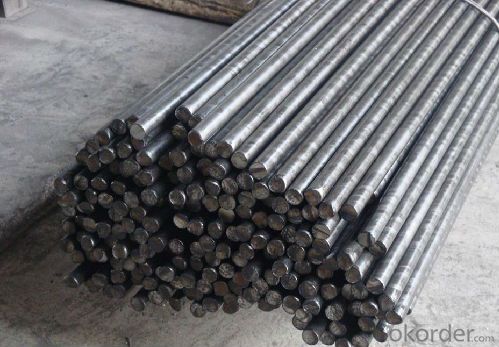
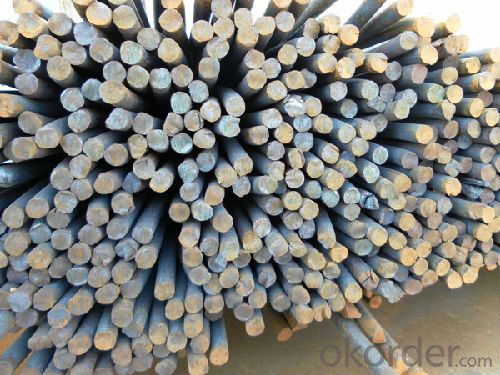
*If you would like to get our price, please inform us the size, standard/material and quantity. Thank you very much for your attention.
- Q: How does special steel perform in cryogenic creep resistance?
- Special steel is renowned for its outstanding capability to resist cryogenic creep. Cryogenic creep refers to the deformation that materials undergo under constant stress in extremely low temperatures. Unlike other materials, special steel demonstrates superior resistance to this type of deformation, thanks to its distinct composition and manufacturing processes. The frigid environment encountered in cryogenic applications can weaken conventional materials and render them more susceptible to creep deformation. Nevertheless, special steel is purposefully designed to withstand these demanding conditions. Its composition typically contains a higher proportion of alloying elements, such as nickel, chromium, and molybdenum, which enhance its mechanical properties and bolster its resistance to cryogenic creep. Additionally, special steel undergoes meticulous heat treatment and processing techniques to optimize its microstructure and fortify its grain boundaries. Consequently, the resulting material possesses improved strength, toughness, and resistance to creep deformation, even at extremely low temperatures. The exceptional performance of special steel in cryogenic creep resistance renders it highly suitable for applications involving the storage, transportation, or processing of materials at cryogenic temperatures. Industries such as aerospace, energy, and scientific research heavily rely on special steel to construct cryogenic storage tanks, superconducting magnets, cryogenic valves, and more. To conclude, special steel's remarkable performance in resisting cryogenic creep can be attributed to its unique composition, heat treatment, and processing techniques. Its ability to maintain its mechanical properties and withstand deformation at extremely low temperatures makes it an ideal choice for various cryogenic applications.
- Q: What are the properties of wear-resistant steel?
- Wear-resistant steel possesses several key properties that make it highly effective in withstanding wear and abrasion. These properties include high hardness, excellent toughness, good strength, and resistance to impact and fatigue. It also exhibits a low coefficient of friction, which reduces the frictional forces acting on the material, thereby minimizing wear. Additionally, wear-resistant steel is often characterized by high corrosion resistance, ensuring its durability in harsh environments. Overall, these properties make wear-resistant steel a reliable and long-lasting material for applications where wear and abrasion are significant concerns.
- Q: What are the properties of structural steel?
- Structural steel possesses several key properties that make it an ideal material for construction. Firstly, it has high strength, allowing it to bear heavy loads and resist deformation. Additionally, it exhibits excellent ductility, meaning it can be easily shaped without breaking. Structural steel is also highly durable and corrosion-resistant, providing long-lasting stability to buildings and structures. Moreover, it offers versatility in terms of design and construction methods. Finally, it is a sustainable and recyclable material, making it environmentally friendly. Overall, the properties of structural steel contribute to its widespread use in various construction projects.
- Q: How does special steel contribute to the manufacturing of precision components?
- Special steel plays a crucial role in the manufacturing of precision components by offering superior strength, durability, and resistance to wear and corrosion. Its unique properties allow for the production of complex and intricate parts that require high levels of precision and accuracy. Additionally, special steel often exhibits excellent machinability, enabling manufacturers to achieve tight tolerances and fine finishes. Overall, special steel enhances the performance and reliability of precision components, making it an essential material in the manufacturing industry.
- Q: How does special steel perform in terms of wear resistance?
- Special steel performs exceptionally well in terms of wear resistance. It is specifically engineered to withstand abrasive forces, making it highly durable and long-lasting even in demanding environments. The unique composition and heat treatment processes used in its production enhance its hardness, toughness, and ability to resist wear, ensuring that it can withstand friction, impact, and other forms of wear and tear with minimal degradation.
- Q: What are the main applications of special steel in the chemical industry?
- Special steel is extensively used in the chemical industry for various applications. Some of the main applications include the manufacturing of storage tanks, pipelines, and equipment that require resistance to corrosion, high temperatures, and pressure. Special steel also finds use in the production of catalysts, which are vital for many chemical processes. Additionally, it is employed in the construction of reactors, heat exchangers, and other critical components that require exceptional durability and reliability in harsh chemical environments.
- Q: How does special steel contribute to improving product resistance to environmental factors?
- Special steel contributes to improving product resistance to environmental factors in several ways. Firstly, special steel alloys are specifically designed to have enhanced corrosion resistance, which helps protect the product from rusting or deteriorating when exposed to moisture, chemicals, or harsh weather conditions. Additionally, special steel can have increased strength and hardness, making the product more durable and able to withstand mechanical stress or impacts caused by environmental factors. Moreover, some special steel alloys have excellent heat resistance, enabling the product to maintain its structural integrity and performance even at high temperatures. Overall, the unique properties of special steel make it an ideal material choice for enhancing product resistance to various environmental factors.
- Q: How does special steel perform in construction applications?
- Special steel, also known as alloy steel, plays a crucial role in construction applications due to its exceptional properties and performance characteristics. This type of steel is specifically engineered to possess enhanced strength, durability, and resistance to various environmental factors, making it highly suitable for demanding construction projects. One of the key advantages of special steel in construction is its high strength-to-weight ratio. This means that it can withstand heavy loads and pressures while maintaining a relatively low weight, allowing for more efficient and cost-effective designs. Additionally, special steel exhibits excellent fracture toughness, which ensures that structures built with this material can withstand significant impacts and vibrations without failing. Another significant benefit of special steel is its exceptional corrosion resistance. Construction projects often face exposure to harsh weather conditions, chemicals, and moisture, which can lead to rusting and deterioration of traditional steel. However, special steel contains elements such as chromium, nickel, and molybdenum, which provide excellent resistance to corrosion and oxidation, ensuring the longevity and durability of structures. Furthermore, special steel offers excellent weldability, allowing for efficient and secure joining of various components during construction. This enables the fabrication of complex structures while maintaining their integrity and strength. In addition to its mechanical properties, special steel can also provide additional benefits in construction applications. For example, certain types of special steel possess excellent fire resistance, making them ideal for constructing fire-resistant structures or components. Furthermore, some types of special steel offer enhanced electrical conductivity, making them suitable for applications that require efficient transmission of electricity. Overall, special steel's superior strength, durability, corrosion resistance, weldability, and additional properties make it an excellent choice for a wide range of construction applications. From high-rise buildings, bridges, and infrastructure to offshore structures and industrial facilities, special steel ensures the construction of safe, reliable, and long-lasting structures in various challenging environments.
- Q: How does special steel contribute to the automotive racing machinery industry?
- Special steel plays a crucial role in the automotive racing machinery industry by providing high-performance materials that enhance the performance, durability, and safety of racing vehicles. One of the primary contributions of special steel to the industry is its ability to improve the power and speed of racing cars. Special steel alloys, such as carbon fiber-reinforced steel or high-strength steel, offer superior strength-to-weight ratios, allowing manufacturers to reduce the weight of the vehicle while maintaining structural integrity. This reduction in weight enhances the acceleration and maneuverability of the racing car, resulting in increased speed and improved lap times on the track. In addition to improved performance, special steel also contributes to the safety of racing vehicles. The high strength and impact resistance properties of certain steel alloys make them ideal for constructing roll cages, chassis, and other critical safety components. These materials can withstand extreme forces during crashes or collisions, providing enhanced protection for the driver and minimizing the risk of severe injuries. Special steel also contributes to the longevity and durability of automotive racing machinery. The harsh conditions of racing, such as high temperatures, vibrations, and mechanical stress, can cause regular steel to deform or deteriorate quickly. However, special steel alloys are specifically engineered to withstand these demanding environments, ensuring that racing cars can endure the rigorous demands of the sport without compromising performance or safety. Furthermore, special steel alloys offer excellent thermal conductivity and heat resistance properties, which are essential for racing vehicles that generate immense heat during high-speed runs. By efficiently dissipating heat, special steel helps prevent overheating and ensures optimal engine performance, reducing the risk of mechanical failures and maximizing the lifespan of the racing machinery. In summary, special steel contributes significantly to the automotive racing machinery industry by enhancing the performance, durability, and safety of racing vehicles. The use of high-performance steel alloys helps increase speed, improve lap times, and reduce the weight of the vehicles. It also provides superior strength and impact resistance, enhancing safety during crashes or collisions. Moreover, special steel alloys offer excellent heat resistance and thermal conductivity, ensuring optimal engine performance and prolonging the lifespan of the racing machinery.
- Q: How does special steel perform in high-frequency applications?
- High-frequency applications benefit greatly from special steel, also known as high-speed steel (HSS), due to its remarkable performance. This steel is specifically engineered to endure the intense heat and stress encountered during high-speed machining operations. The distinctive composition of special steel, which typically includes elements like tungsten, molybdenum, cobalt, and vanadium, grants it exceptional hardness, toughness, and resistance to wear. These properties make it highly suitable for high-frequency applications that involve rapid cutting speeds and frequent abrasion. Special steel's excellent hardness allows it to maintain its cutting edge even at elevated temperatures, ensuring superior performance in high-frequency applications. It experiences minimal deformation or loss of cutting efficiency, resulting in increased productivity and tool longevity. Additionally, its exceptional wear resistance enables it to withstand the constant friction and heat generated during high-speed machining operations, thus preventing premature tool failure. Furthermore, special steel possesses excellent thermal conductivity, which aids in dissipating the heat produced during high-frequency applications. This characteristic is crucial for preserving dimensional stability and preventing warping or distortion under extreme temperatures. Consequently, special steel tools can maintain their precision and accuracy even during prolonged high-frequency operations. In conclusion, special steel's exceptional hardness, toughness, wear resistance, and thermal conductivity make it highly effective in high-frequency applications. Its ability to withstand extreme heat and stress while preserving cutting performance and dimensional stability has established it as the preferred choice in industries such as aerospace, automotive, and manufacturing, where high-speed machining is indispensable.
Send your message to us
High Quality Spring Steel Round Bar 12-16mm
- Loading Port:
- China main port
- Payment Terms:
- TT or LC
- Min Order Qty:
- 100 m.t
- Supply Capability:
- 10000 m.t/month
OKorder Service Pledge
OKorder Financial Service
Similar products
Hot products
Hot Searches
Related keywords
